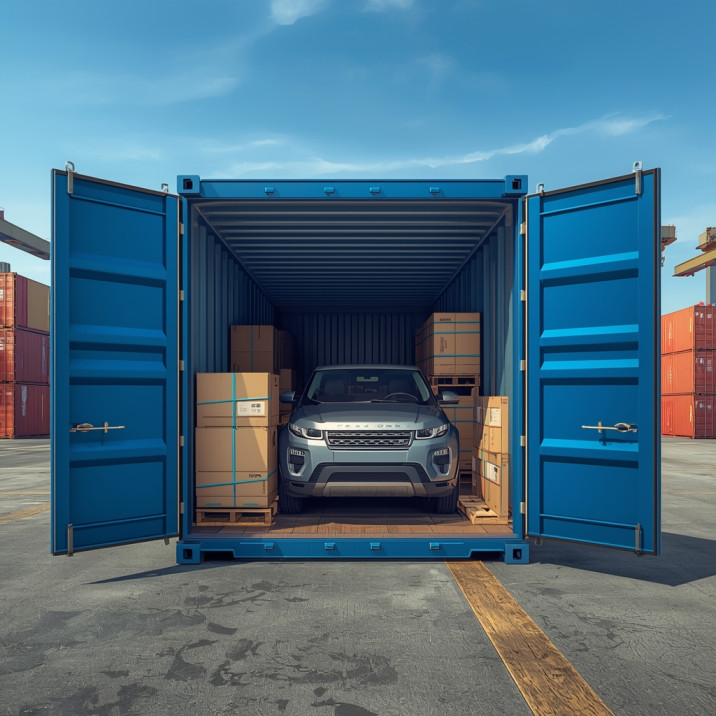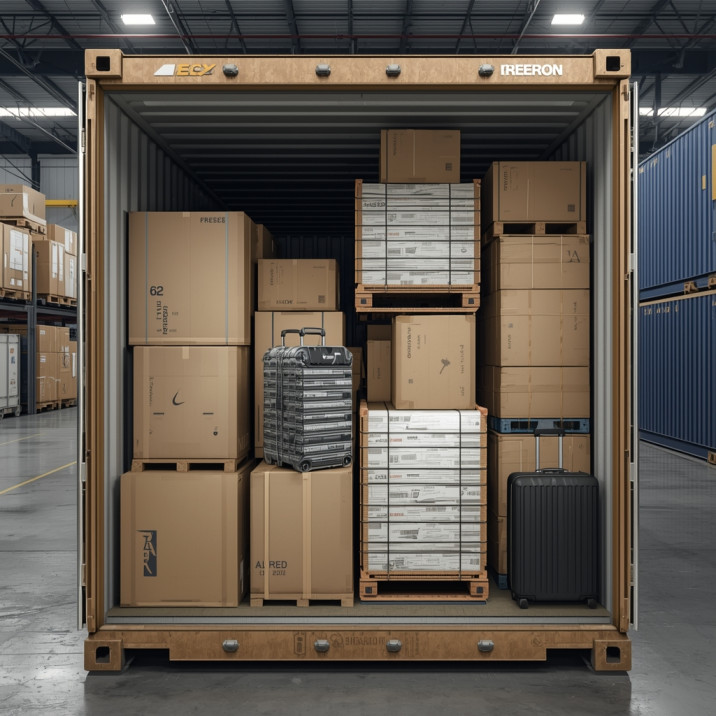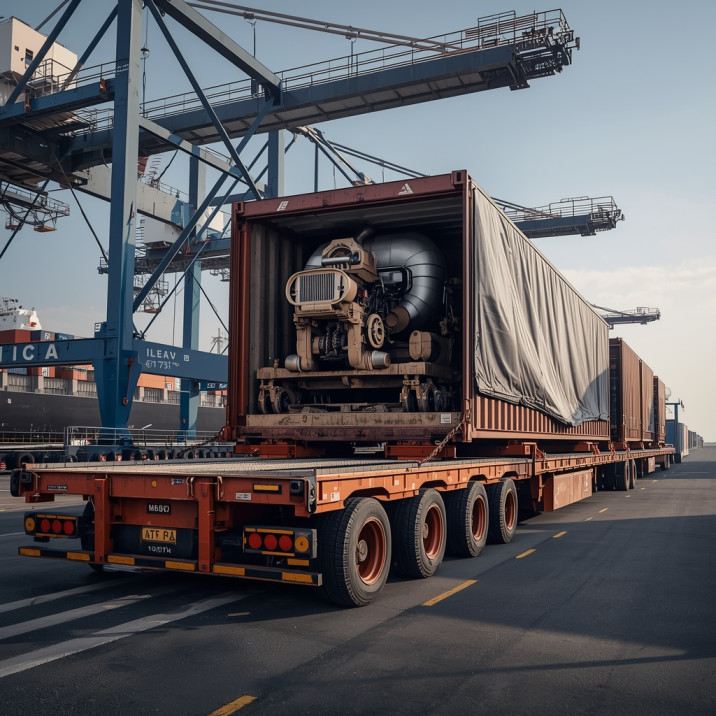If you searched “ship a container to Malaysia,” USA to Malaysia Container Shipping, or just need to get Ocean Freight to Malaysia or just need to get Overall International Container Shipping Malaysia information, you’re in the right place.
This guide explains how container shipping from the USA to Malaysia works, including service options, container types, cargo compatibility, transit times, costs, and documentation requirements.
In general, container shipping is one of the most flexible and widely used methods for exporting cargo to Malaysia. Specifically, it supports personal shipments, commercial exports, vehicles, boats, palletized freight, machinery, and oversized cargo, with multiple loading and handling options available.
Meanwhile, All Transport Depot Inc. operates as a licensed and bonded FMC NVOCC (#021693) and coordinates container shipments from anywhere in the USA to major ports in Malaysia through established global ocean carriers.
🚢 Ship with Confidence. Partner with world-renowned NVOCCs and leading global ocean carriers.
👉 Get a Rate:
https://alltransportdepot.com/roro-shipping-cost/
👉 Place Your Order:
https://alltransportdepot.com/place-order/
📲 WhatsApp: +1 (470) 791-4497
📞 Call: +1 (678) 528-5794
📧 Email: ship@alltransportdepot.com
All TransportDepot Inc.
FMC Licensed & Bonded NVOCC #021693
Get Ocean Freight to Malaysia
Container Shipping Services to Malaysia
Container shipping services to Malaysia are structured to support both private and commercial exporters, while also offering flexibility based on cargo type, loading preference, and location.
🚪 Door-to-Port Shipping
In this case, Door-to-Port shipping includes pickup of cargo from a residential address, business, dealership, or warehouse anywhere in the USA, followed by export handling and ocean transport to Malaysia.
Accordingly, this option is commonly used for:
International relocations -Ocean Freight to Malaysia
Household goods and personal effects
Boats and vehicles
Commercial exports shipped directly from origin
🏠 Container Delivered to Your Location for Loading (Self-Load Option)
Door-to-Port Container Delivery for Client-Managed Loading
As part of Door-to-Port service, a container may be delivered directly to a residence or business for client-managed loading. In practice, this option is selected by shippers who want direct oversight of packing and loading.
In this scenario:
-
First, an empty container is delivered on a chassis
-
Then, the container remains on the chassis throughout loading
-
Next, the client completes loading
-
Finally, the container is returned to the terminal for export to Malaysia
Accordingly, this option is commonly used for:
-
Household goods
-
Furniture
-
Mixed cargo
-
Palletized items
Access & Loading Considerations
-
In addition, appropriate loading equipment must be available where required
-
Likewise, vehicles or machinery typically require ramps, docks, or lifting equipment
-
However, if loading extends beyond the scheduled window, additional charges may apply
-
Furthermore, residential or HOA-managed properties may require advance approval
-
Ultimately, any third-party costs (property access restrictions, extended truck time, or local fees) are passed through to the shipment account
🏢 Warehouse-to-Port Shipping
Warehouse-to-Port service is ideal for shippers who prefer professional handling and loading. In this case, cargo is delivered to a U.S. export warehouse, where containers are loaded, secured, and prepared for ocean transport.
Accordingly, this option is commonly used for:
-
Vehicles
-
Boats and marine equipment
-
Palletized commercial freight
-
Machinery and crated cargo
-
High-value or complex shipments
🔒 Professional Warehouse Loading
Warehouse loading allows trained personnel to handle:
-
Blocking and bracing
-
Weight distribution
-
Cargo separation
-
Compliance with ocean carrier and terminal standards
As a result, this approach reduces risk and is recommended for:
-
Boats
-
Machinery
-
Oversized cargo
-
Mixed loads
📦 Shipper-Owned Containers (SOC)
Shipper-Owned Containers (SOC) may be used provided the equipment meets port and carrier acceptance requirements. In this case, SOC shipments typically include:
-
Trucking
-
Export filing
-
Ocean booking
-
Terminal coordination
SOC containers generally must:
-
Be seaworthy and watertight- Before you buy a container, be sure to ask for the seaworthy and watertight certificate
-
Be neutralized (no shipping-line branding or prefixes)
-
Pass terminal inspection prior to acceptance
However, containers that do not meet acceptance standards may be subject to:
-
Additional handling
-
Repositioning
-
Rebooking charges
What Can Be Shipped in a Container to Malaysia?
Container shipping supports nearly all cargo types. In general, if cargo can be safely secured and complies with export regulations, it can typically be shipped by container.
Accordingly, common containerized cargo includes:
-
Vehicles (cars, SUVs, vans, motorcycles)
-
Boats & marine equipment (trailered boats, jet skis, small vessels)
-
Household goods & personal effects
-
Furniture and mixed cargo
-
Palletized freight (commercial or wholesale)
-
Machinery & industrial equipment
-
Construction materials
-
Crated or boxed shipments
-
Oversized and non-standard cargo (open-gauge)
Ultimately, if your cargo fits in — or on — a container, it can typically be shipped to Malaysia with the correct equipment and documentation.
All Container Types Available for Shipping to Malaysia
Different cargo types require different container configurations. Accordingly, available container options include:
-
20-Foot Standard Containers
-
40-Foot Standard Containers
-
40-Foot High Cube Containers
-
Open-Top Containers
-
Flat Rack Containers
-
Open-Gauge Containers
-
Refrigerated (Reefer) Containers
-
Hazmat-Approved Containers
-
Shipper-Owned Containers (SOC)
In particular, open-top, flat rack, and open-gauge containers are commonly used for boats, machinery, industrial cargo, and oversized freight that exceed standard container dimensions.
How Cargo Is Loaded Into Containers
Loading methods vary based on cargo type, size, and origin location. Accordingly, common methods include:
-
Warehouse loading using forklifts and professional bracing
-
Client-managed loading at a residence or business
-
Crane-assisted loading for boats, machinery, or SOC containers
-
Ramp or dock loading for rolling cargo
-
Palletized loading for boxed or commercial freight
Ultimately, selecting the correct loading method helps ensure port acceptance, cargo safety, and smooth customs processing.
Who Typically Ships Containers to Malaysia?
Container shipping to Malaysia is commonly used by a wide range of customers. In particular, this includes:
-
Families relocating internationally
-
Auto exporters and dealerships
-
Boat owners and marine businesses
-
Furniture and mixed-cargo shippers
-
Commercial exporters and wholesalers
-
Contractors shipping equipment into the EU
🚢 Ship with Confidence. Partner with world-renowned NVOCCs and leading global ocean carriers.
👉 Get a Rate:
https://alltransportdepot.com/roro-shipping-cost/
👉 Place Your Order:
https://alltransportdepot.com/place-order/
📲 WhatsApp: +1 (470) 791-4497
📞 Call: +1 (678) 528-5794
📧 Email: ship@alltransportdepot.com
All TransportDepot Inc.
FMC Licensed & Bonded NVOCC #021693
Why Ship a Container to Malaysia?
Malaysia is a key logistics gateway to Southern Europe, supported by modern port infrastructure and efficient customs procedures. Consequently, shipping a container to Malaysia provides direct access not only to the Portuguese market but also to the broader European Union. Moreover, its strategic Atlantic location strengthens trade routes between North America and Europe. Therefore, many exporters and private shippers select Malaysia as their primary EU entry point.
Accordingly, container shipping to Malaysia proves particularly well-suited for:
-
First, international relocations
-
Next, vehicle and boat exports
-
Additionally, commercial and wholesale cargo
-
Likewise, furniture and personal effects
-
Finally, machinery and industrial equipment
Transit Times When Shipping a Container to Malaysia
Transit times depend significantly on the departure port in Asia. Generally speaking, estimated ocean transit durations are as follows:
-
East Asia (Shanghai, Busan): 5–8 days
-
Southeast Asia (Singapore, Jakarta): 3–6 days
-
Middle East (Dubai): 10–14 days
Nevertheless, transit times may vary due to vessel schedules, port congestion, weather disruptions, and seasonal demand fluctuations. Hence, booking early and maintaining flexible shipping plans can ensure smoother transit.
Shipping Rates to Malaysia (Asia → Malaysia)
Shipping costs fluctuate based on container size and origin port. Typically, estimated rate ranges include:
20-Foot Container, For Example
-
East Asia: $1,200 – $1,800
-
Southeast Asia: $900 – $1,400
-
Middle East: $1,500 – $2,100
40-Foot Container, For Example
-
East Asia: $2,100 – $3,000
-
Southeast Asia: $1,700 – $2,400
-
Middle East: $2,500 – $3,500
Still, rates vary depending on container specifications, port of loading, cargo nature, and carrier fees.
Main Ports in Malaysia for Container Shipping
Malaysia boasts a comprehensive and advanced seaport and maritime logistics infrastructure that facilitates international container shipping, RoRo vehicle transport, project cargo, heavy machinery freight, bulk commodities, breakbulk shipments, and oversized equipment exports. Consequently, choosing the appropriate Malaysian destination port is essential for ocean transit time, inland trucking distribution, intermodal rail connections, customs clearance, import processing efficiency, and last-mile delivery when shipping containers to Malaysia.
Below are the two primary international container ports in Malaysia commonly used for Asia–Malaysia ocean freight, full-container-load (FCL) shipments, consolidated cargo, commercial exports, household goods relocations, and vehicle imports.
⚓ Port Klang — West Coast Malaysia
Best for: Containers, vehicles, household goods, commercial cargo, international relocations, RoRo shipments, palletized freight, project cargo, personal effects, import/export shipments
Therefore, key advantages include:
-
Extensive container terminal infrastructure and advanced cargo-handling facilities
-
Robust road and rail intermodal connectivity for efficient inland freight transport
-
Streamlined Malaysian customs clearance and port processing
-
Frequent ocean sailings from major Asian container ports
-
Excellent access for inland trucking across Peninsular Malaysia
In practice, shippers often use Port Klang for:
-
Household goods and personal effects shipments
-
Vehicle and motorcycle imports to Malaysia
-
Commercial and palletized export cargo
-
Mixed, consolidated, and full-container-load (FCL) shipments
🔗 Port Klang Authority:
https://www.pka.gov.my
⚓ Port of Tanjung Pelepas — Southern Malaysia
Best for: Containers, vehicles, bulk cargo, industrial freight
Consequently, key advantages include:
-
First, state-of-the-art deep-water container terminals
-
Next, high efficiency in handling industrial and commercial cargo
-
Additionally, strong logistics connections to southern Malaysia and Singapore
-
Furthermore, reduced inland transport time for Johor and southern destinations
-
Finally, reliable handling of oversized and project cargo
For these reasons, shippers frequently select Tanjung Pelepas for:
-
In particular, commercial and wholesale imports — a significant factor
-
Likewise, industrial machinery and heavy equipment
-
Also, vehicles and rolling cargo
-
As well, oversized or non-standard container shipments
🔗 Port of Tanjung Pelepas Authority (LPPT):
https://www.lppt.gov.my
Choosing the Right Port in Malaysia
When shipping a container to Malaysia, generally, the decision between Port Klang and Tanjung Pelepas depends on several important factors. Specifically, these include:
-
First, the final delivery location within Malaysia
-
Next, cargo type and size
-
Additionally, inland transport and distribution needs
-
Finally, customs clearance and documentation preferences
Ultimately, both ports can accommodate standard containers, high-cube units, open-top containers, flat racks, and specialized cargo, depending on shipment requirements.
Customs & Documentation (Malaysia – 2026)
When shipping a container to Malaysia, customs clearance is a crucial step. Therefore, shippers must prepare all necessary documents beforehand. Typically, required documentation includes:
-
First, the Bill of Lading
-
Next, a Commercial Invoice and Packing List
-
Additionally, company registration or identification documents
-
If applicable, vehicle registration and title documents
-
Likewise, export declarations as required by the origin country
Import Duties & Taxes – International Container Shipping Malaysia
Upon arrival in Malaysia, customs authorities may impose import charges. Consequently, importers should expect the following:
-
Primarily, customs duty based on HS tariff classification
-
Additionally, GST (Goods and Services Tax) and port handling fees
-
In some cases, extra charges for restricted or controlled goods
📞 Malaysia Customs (Port Klang): +60 3 2070 2000
FAQs – Shipping Containers to Malaysia
Can a container be delivered to a home for loading?
Yes. In many cases, Door-to-Port service delivers the container directly to a residence or business for client-managed loading, subject to access and scheduling considerations.
When a container is delivered to my door, will it be placed on the ground or remain on a chassis?
Typically, the driver keeps the container on a chassis during the loading window. Ground placement remains uncommon and may require special equipment, permits, or additional fees.
How long can I keep the container for loading?
In most cases, we schedule a loading window—often 1–3 days—although some locations allow only a short live-load period (such as two hours). Additional time may result in daily charges.
Can boats and vehicles ship in containers?
Yes. In general, we ship boats, vehicles, and marine equipment using standard, open-top, flat rack, or open-gauge containers. Although this may be true Roro is a great alternative.
Do services support oversized cargo?
Yes. Accordingly, we offer open-top, flat rack, and open-gauge container options.
Do I need special equipment to load heavy cargo?
Yes. As a matter of fact, You may need forklifts, ramps, cranes, or docks to load vehicles, boats, or machinery.
Is export documentation handled?
Yes. We typically handle U.S. export filings and coordination together with Ocean Freight to Malaysia
What documents are required to ship to Malaysia?
Generally, you must provide export filings, commercial invoices, packing lists, vehicle titles (if applicable), and consignee identification. Above all
Generally, this includes export filings, commercial invoices, packing lists, vehicle titles (if applicable), and consignee identification.
Will I need to pay duties or taxes in Malaysia? USA to Malaysia Container Shipping
Yes. Depending on the shipment and Ocean Freight to Malaysia. Portuguese customs may assess import duties, VAT, or clearance fees.
Can customs clearance be arranged in Malaysia?
Yes. Additionally, local agents can assist with destination customs processing to help with International Container Shipping Malaysia
Is marine insurance available?
Yes. Additionally, we can arrange marine cargo insurance upon request. this is not part of Ocean Freight to Malaysia.
Can I track my container during transit? USA to Malaysia Container Shipping
Yes. Moreover, we can arrange inland delivery from the port to the final Port destination. All things considered, when considering USA to Malaysia Container Shipping
Start Your 2026 Shipment to Malaysia- International Container Shipping Malaysia
All Transport Depot Inc. All in All actively provides Door-to-Port, Warehouse-to-Port, and SOC container shipping services from anywhere in the USA. From pickup through export documentation and ocean transport, For instance our team manages every shipment with precision, professionalism, and care.
👉Place Your Order:
https://alltransportdepot.com/place-order/
📧 Email: ship@alltransportdepot.com
📞 Call: +1 (678) 528-5794
📲 WhatsApp: +1 (470) 791-4497

Ryan is an experienced truck driver at Lone Star Auto Transport. He’s logged thousands of miles, safely delivering vehicles across the vast expanse of Texas and beyond. His commitment to on-time deliveries and vehicle care is unmatched.



